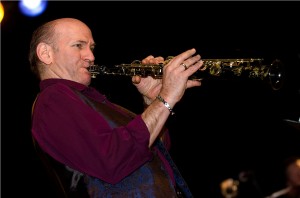Justin’s Japan: Interview with NEA Jazz Master David Liebman

2011 NEA Jazz Master Dave Liebman. (Marek Lazarski, courtesy of the National Endowment for the Arts)
By JQ magazine’s Justin Tedaldi (CIR Kobe-shi, 2001-02) for Examiner.com. Visit his NY Japanese Culture page here to subscribe for free alerts on newly published stories.
Brooklyn-born saxophonist and flautist Dave Liebman is one of this year’s recipients of the NEA Jazz Master Award, which since 1982 is the highest honor the United States bestows upon living jazz musicians. Liebman is best known for his work with the legendary trumpeter Miles Davis, joining his band in 1973 for a 16-month stint and playing on two studio albums, the final ones that Davis would record for the rest of the decade, as well as several live bootleg concerts that are available.
Liebman will appear at a free panel discussion with the other 2011 NEA Jazz Mastersat New York’s Jazz at Lincoln Centeron Jan. 10. (Doors open at 12:45 p.m.)The following night, he will perform at the annual NEA Jazz Masters Awards Ceremony and Concert. For those who can’t attend the sold out show, therewill be a live broadcast on the Newark-based WBGO Jazz 88.3 FM and their website, and Sirius/XM Satellite Radio’s Real Jazz Channel 70. I spoke with the artist about his thoughts on winning this award, his history in Japan, and his intriguing relationship with Miles.
How is one picked to be an NEA Jazz Master?
This is a very good question, which I hope to find out at the ceremony [laughs]…I think past inductees are a part of it—I have no idea. I can’t wait to know, assuming they will tell me the process.
Did you have to campaign for it?
Absolutely not; this was a phone call that came out of nowhere. I think my boss at the Manhattan School of Music, Justin DiCioccio, said he recommended [me], but the truth is, if you go to the site right now, you can put yourself in…the public is free to nominate anybody on the website. So that’s all I know about the process. How it goes from there to deciding [the inductees], I don’t really know, and I’m curious to find out.
You’ve played with Japanese artists and appeared on their albums since the early ’70s. How did that come about, and what were your impressions from visiting Japan through the years?
Of course, I had a lot of action in the ’70s and into the ’80s, but not so much in the last 10 to 15 years. First of all, the Japanese audience at that time was fantastic, and of course Miles Davis was a gigantic hero. The fact that I was with Miles put me right away into a special arena, and sure enough as soon as I got there I recorded. When I was on my first tour with Miles in Japan—it was the only time I went with Miles to Japan—I recorded my first record as a leader [First Visit, with Jack DeJohnette, Richie Beirach and Dave Holland], because Stan Getz’s group was there and the rhythm section was ready to go. I recorded with Abbey Lincoln also that week. In those days, when you went to Japan somehow you ended up with record dates. They were very, very enthusiastic, and business was good.
And then I had, of course, a long-term relationship with Terumasa Hino, the trumpet player, and drummer Motohiko, his brother who passed away a few years ago. I worked many times with the Hinos in Japan at a lot of festivals. Most notably there were two big concerts that I did in the ’80s—one for John Coltrane with Wayne Shorter and then in the ’90s with Michael Brecker, again for Trane ten years later. But as I said, not so much in the last ten to fifteen years. It was fascinating how deep the Japanese audience got into the music and how enthusiastic they were. But it seems to have faded, from what I understand. This generation is not as interested as before. So I can’t speak about the present jazz situation there, but I certainly enjoyed my visits.
Why do you think the Japanese had such an interest and enthusiasm for jazz?
I don’t know. I think they were fascinated by anything American, first of all. They probably loved Dolly Parton, or Sting, or whomever. I think they really liked Western culture. They were fairly prosperous during that period and when prosperity comes, people have more time to do leisure activities, enjoy culture and arts and so forth.
I think the Japanese temperament in general, the arts of Japan—everything from the sword stuff to the tea ceremony to the kimonos to the shakuhachi—they’re a really high class, sophisticated culture; that’s part of their being. And jazz, being as sophisticated as it is appealed to them. I think that’s part of what made them like it more than other cultures in Asia for example. I don’t see China—although we don’t know yet—embracing it the way Japan did, just from the difference of their M.O., the way they are as people. Japan is culturally kind of like the equivalent in Europe of the Germans, who are also very musically sophisticated and are really the best audience to play for as far as educated goes.
When was the last you played in Japan?
I think 2004 or ’05, we did a festival in Kyoto celebrating the history of the city; it was a special festival and I played with my regular working group of the last twenty years. I think that was the last time. You know, in general they just really appreciate art.
Read the rest of the interview here.


Comments are closed.